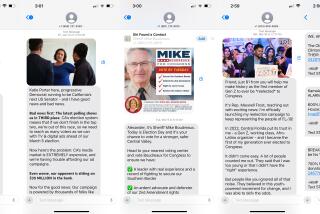Text dollars to pols? Sure
The Federal Elections Commission cleared the way last month for political campaigns to collect small contributions from mobile-phone users through text messages, a proposal backed by both presidential campaigns and a slew of grass-roots groups. One crucial faction, however, isnât so thrilled. That would be the wireless phone companies. The companies want a guarantee that they wonât be held responsible for illegal contributions â a fear that seems to be exaggerated, but one that the commission should dispel swiftly.
The donation plan was proposed by two political consultants and Los Angeles-based Mobile Messaging, a company that helps other firms market products and collect payments through mobile networks. They sought permission to let phone users make campaign contributions to federal candidates by sending a text message authorizing the candidate to bill their mobile account for up to $50 per month â the maximum amount a campaign can collect from an individual without having to itemize the donation and identify its source.
Charities and nonprofits are increasingly using text-messaging services as a fundraising platform, largely because of its reach and convenience. Those advantages help offset the sky-high charges imposed by carriers and other middlemen, which typically claim 30% to 50% of the money donated.
COMMENTARY AND ANALYSIS: Presidential Election 2012
The phone companies proposed to allow political donations via texts in 2010, but the commission rejected the plan in part because it didnât guard adequately against illegal contributions. The Mobile Messaging proposal, however, offered better assurances that the texting system would be no friendlier to illegal or excessive contributions than any other pipeline for small donations. The commission cited those assurances when it unanimously endorsed the proposal on June 11.
Nevertheless, the phone companies â which are the gatekeepers to the text-messaging universe â arenât satisfied with the commissionâs advisory opinion. Theyâve asked the commission to say they donât have to monitor their customersâ bills for evidence of potentially illegal contributions from corporations or foreign citizens, even though the new opinion pretty clearly renders that kind of reporting unnecessary.
The FEC should put an end to the carriersâ foot-dragging and let Americans use their phones to help the candidates they favor. In an era of âsuper PACsâ and unlimited independent expenditures, small-dollar contributions may seem quaint and increasingly irrelevant. But they offer an easy way for more people to get involved in politics, which is just the sort of thing the government should be encouraging.
More to Read
A cure for the common opinion
Get thought-provoking perspectives with our weekly newsletter.
You may occasionally receive promotional content from the Los Angeles Times.










